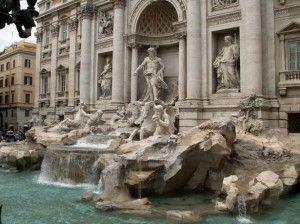Thursday

My notes from a Theology on Tap lecture
476 to Charlemagne
476: It wasn't the fall of the Roman Empire. The Senate was still in session until 600 AD or so. If you had asked the average citizen in, say, Lyon France, what he was, he would've said a Roman.
It's a significant issue because, if the Roman Empire never fell, what happened to it? I'm inclined to believe its soul passed into the Catholic Church, and it's symbolized by the fact that Leo the Great had to deal with Attila in 452. The Church is, in the words of G.K. Chesterton, a Thing . . . The Thing, just like the Empire was a thing and, to most minds, The Thing. A tangible thing.
But still, that Roman Senate wasn't doing much by 476 . . . and much less by 600, basically a town council. And that Roman citizen wasn't getting anything from Rome, which by 600, was probably a town of maybe 20,000, instead of a million, leaving large swaths returning to nature . . . like Detroit today. The decay reminds me of my brother-in-law's father-in-law, who came straight from Italy. You go to Rome now, everything is preserved, etc. That's a new thing. When my brother in law said he wanted to visit the Coliseum, his father-in-law protested. “It's an old dump. When I was a teenager, we would shit in the Coliseum!”
Italy was basically a war zone, with the proper Roman Empire out of Constantinople, Lombards, Ostrogoths and others fighting for control of it.
The Lombards emerged victorious, and they harassed Rome, leaving Gregory I (540-604) to deal with them.
Lombards basically won, eventually pushing even the last of the Byzantine Empire out of Ravenna.
That's when things really started to get tangled between Church and State.
Earlier, Clovis (466-511) had converted: Fierce Franks. For them to convert, it was huge. No one messed with the Franks; they were the nasty boys of the neighborhood . . . but proudly Catholic, in their own savage way.
Today's French . . . hard to get our minds around it. Nothing in common, except the lack of deodorant.
Others followed, out of fear, respect, or pulverization. Consolidated much of France for two hundred years under Merovingian control, then control passed to the Carolingians.
When the Lombards started exerting a stranglehold on Italy (750 c), Pope Stephen II appealed to Pepin, king of the Franks. Pepin came in, thrashed the Lombards, and, THIS IS IMPORTANT, made a gift, The Donation of Pepin, of the Papal States to the pope. Basically, the last area controlled by the Byzantine was given the Pope, making the Pope a real king, not just an ecclesiastical authority. Thereafter, the title of Pope came with real power: arms, money. Thereafter, it became a sought after title by crooked men who wanted the power for their families.
But that didn't resolve the Lombard problem. The Lombards continued to harass Rome and the Papal States.
I don't want to get too thick into the weeds here, but you need to understand Pepin's on, Charlemagne. He and his co-ruler brother, Carloman, didn't like each other. Carloman had ties with the Lombards. After Carloman died, his family, fearing Charlemagne, went to the Lombard court, leaving Charlemagne without much affection for them (a tension increased when Charlemagne sent his Lombardian bride packing in favor of someone else).
Pope Adrian I has troubles with the Lombards. Asks Charlemagne for help. Charlemagne, a great warrior with no love for the Lombards and an old promise made by his ancestors to the Papacy, came down and beat some heiny. This became a theme: Whenever the Pope had problems, esp with the Lombards, he'd call in The Protector.
This culminates in the year 800. Leo III. Holy Roman Empire begins (Otto I . . . maybe, but go with this). Would continue until 1806.
You now basically have a cementing of the political church. And it's not a good thing. The emperor is “holy,” with real ecclesiastical authority, resulting in some absurd results, like Carolingian theologians declaring certain Church councils couldn't have been valid because the Carolingians weren't there. The Pope, meanwhile, has a direct pipeline to military power . .. . and the money and prestige that comes with it.



